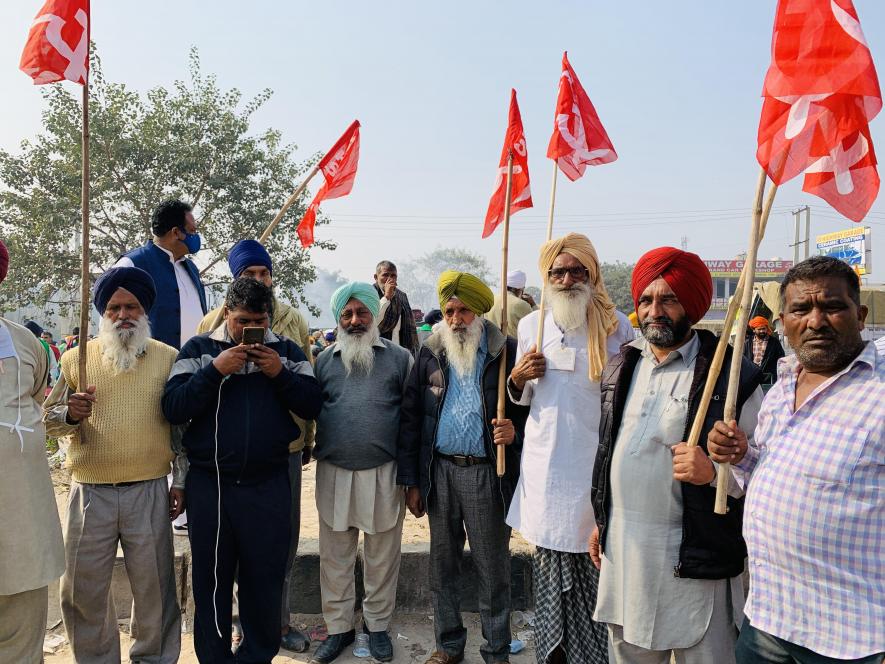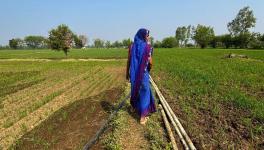Farmers’ Protest: Land is not Just an Economic Affair, but an Emotional One Too

New Delhi: “What would you say if farmers choose to give poison to their children on the auspicious day of Lohri?” The mind-numbing question came from Surjit Singh Dher from Ludhiana, who, along with his friends, is stationed at Delhi’s Singhu Border. There are here to protest against the three Farm Laws amid negotiations with the Centre. Dher’s question gives an insight into the precarious situation the distressed farmers face, with the laws only triggering anxiety of an uncertain future.
Carrying the red flag, Dher explained the finer details of the crisis. “The farmers in Punjab are angry because they were offered very little from the beginning. Even that is being snatched from them now. Farmers grow 23 crops in Punjab but we only get minimum support price for wheat and rice at the APMC mandi. We expected that the market would reward other crops but it is certainly not the case. We grew maize this year for which the MSP was announced at Rs 1,850 per quintal. However, no one was willing to pay more than Rs 1,400 per quintal,” he said.
Dher maintained that the low profit in agriculture has forced many youngsters to abandon it altogether and look for jobs paying as low as Rs 7,000 per month. “The government chooses to pay MSP for wheat and rice because it procures them for distribution among the poor, but it must also realise that we grow other crops too. If the Kerala government can choose to pay MSP for vegetables, why can’t other governments?” Dher was referring to the Kerala Government’s decision in late October; the state listed 16 varieties of vegetables which will be bought at MSP.
However, it is not only the crop-coverage which has enraged the farmers, but also the formula used for fixing the MSP. The farmers allege that major costs like the diesel used in tractors and the labour they put in have been consistently ignored. Vikram Singh Gill, a former employee of the agriculture department and a protester here, laid bare the mathematics of costs involved in agriculture. Gill, who hails from Shri Anandpur Sahib in Roop Nagar District in Punjab, said he planted rice in seven acres of his land. The average yield per acre is estimated to be around 18 to 20 quintals.
Gill said that the process of growing a crop begins with ploughing and watering the land, which would cost about Rs 5,000. After the land is watered, the seeds and fertilisers cost about Rs 2,000 and Rs 1,400 respectively. After forty days of waiting, the first batch of urea is spread in farms which are watered again. While urea costs close to Rs 700, the price of watering the land comes up to Rs 1,200. Weedicides are then introduced, which would cost about Rs 1,700.
About 40 days later, urea and fungicides are used on the crop, the processes setting the farmer back by Rs 700 and Rs 900 respectively. Labour for harvesting, transportation and cleaning of produce at the mandi costs around Rs 6,000, Rs 2,000 and again Rs 2,000 respectively. Gill added that the labour employed to spray the pesticides and weedicides take Rs 1,700 for four spells of spraying. Banks too charge 13% on the loans advanced for the crops. On top of that, aadhatiya or middlemen charge 6.5% and the mandi board take 2.5% of the sale (a total of Rs 2880). In the end, the cost comes to around Rs 30,180 per acre whereas the sale would fetch Rs 32,000; the profit is around Rs 1,820 per acre. Notably, family labour is still unaccounted for. If Gill’s harvest over seven acres is taken into account for two crops a year, he gets Rs 25,480 a year, or a mere Rs 2,124 per month.
A similar return is expected for wheat this winter if the government does not announce a significant increase in MSP. “How does one pay children’s fees and care for the ill and elderly when everything is getting privatised?” he asked.
A conversation with the farmers revealed that land is not just an economic affair, but also an emotional one. “Our parents educated us and married my sisters off just because we had some land. They told us to barter everything but not land, because it is our mother. Now, the corporates want to snatch it from us. We cannot let it happen,” he said.
Gurdarshan Singh, district president of Gurdaspur of the All India Kisan Sabha, argued that the abysmal condition of peasantry should be linked with the consistent weaning of co-operative systems in Punjab. Speaking to NewsClick, he said: “The co-operatives are very negligible in the state. Now, we only get urea through it. But not long ago, we use to get sugar and other items too. However, it did not get the support required from the government. They could have really proven crucial in uplifting the marginalised and small farmers.”
The protest site is also teeming with cheerful slogans of women participants who dispel some myths about farmers of the country. Gursharan Kaur, who is here from Batala in Gurdaspur, said that families are struggling to get their children educated, enroll in courses or send them abroad to find jobs. “There are no jobs in the private sector. We all dependent on agriculture now. If this is gone too, what will we eat? We will only go when Modi repeals the laws,” she added.
“It is unfair to say that farmers do not understand the laws and that we need somebody else to understand what they mean. Our children are educated and they know what is good or bad for them,” said Surjit Kaur, another protester.
Get the latest reports & analysis with people's perspective on Protests, movements & deep analytical videos, discussions of the current affairs in your Telegram app. Subscribe to NewsClick's Telegram channel & get Real-Time updates on stories, as they get published on our website.
























